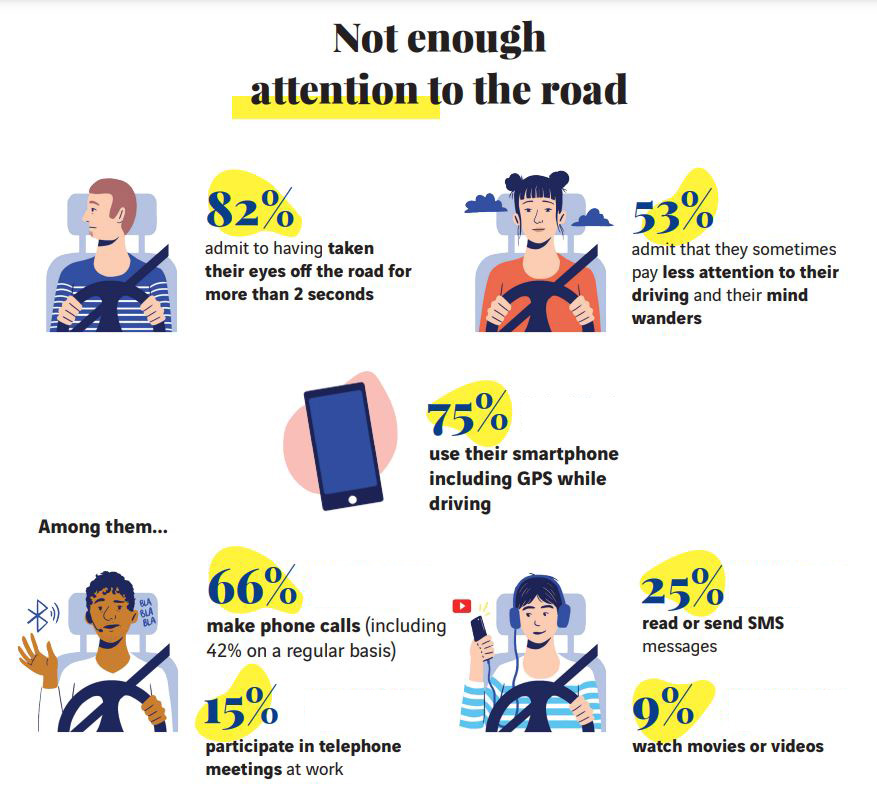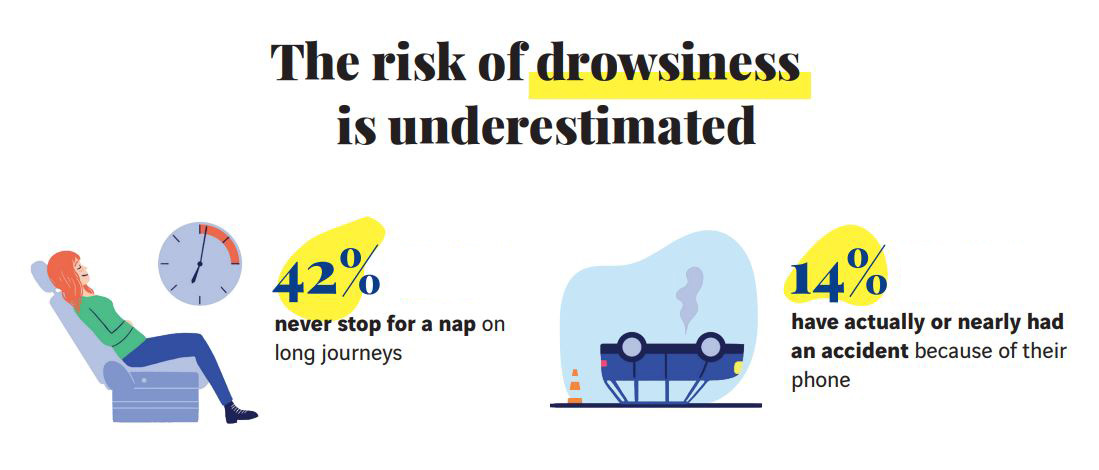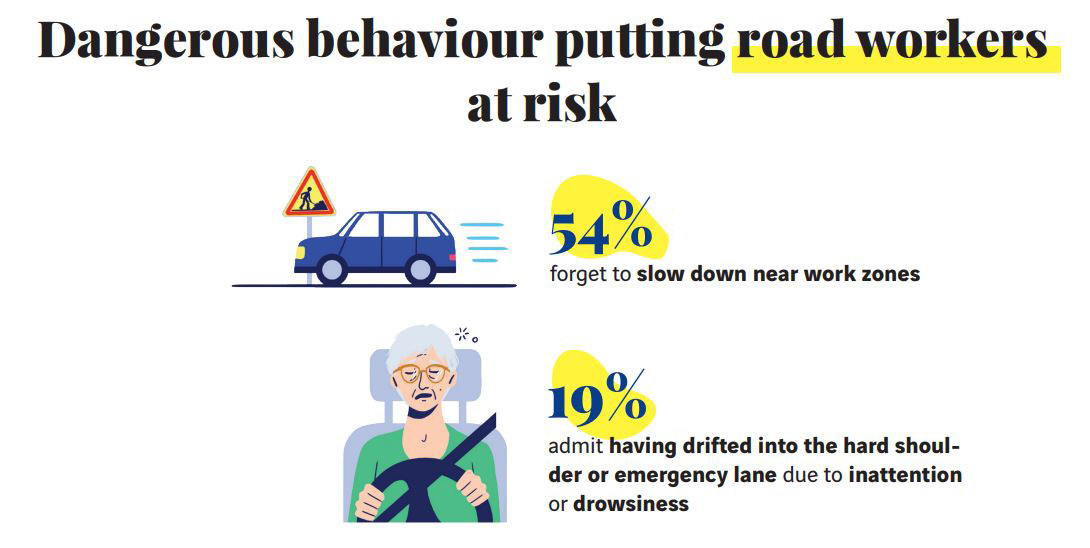53% of European drivers admit they had mental blanks at the wheel

Lack of attention: telephone conversations, mind wandering[1], looking away from the road: there are numerous ways in which drivers can lose control
82% of European drivers admit to having taken their eyes off the road for more than 2 seconds (+6 points), which is equivalent to driving at least 72 metres “blind” at 130 km/h.
53% admit that they sometimes pay less attention to their driving and that their mind wanders.
75% of Europeans use their smartphones at the wheel, for all purposes including GPS:
- 66% to use the telephone, 42% regularly, i.e. +5 points vs 2018 with a Bluetooth system (55%), a headset or earpiece (32%) or held in the hand (25%).
- 25% to read or send SMS messages (+3), including 44% of those under 35.
- 15% to participate in remote work meetings, including 21% of working people and 29% of those in the top income bracket.
- 9% to watch a film or video (+2) including 20% of those under 35s.
12% (+5 pts in 5 years) have actually or nearly had an accident because they were using a mobile phone while driving.

Drowsiness: an underestimated risk and insufficiently widespread good practices
42% of European drivers continue to drive even though they feel very tired, because they have to keep going (+7).
39% believe that they drive just as well, or even better, when they are tired.
42% never stop for a nap on long journeys (-6).
14% have actually or nearly had an accident due to drowsiness (+5 vs 2018).

Road rage: although we all believe we are responsible drivers, aggressive behaviour is still everywhere on the road
97% of European drivers have a positive opinion of their own driving.
52% acknowledge that they sometimes insult other drivers.
22% admit to getting out of their vehicle to argue with another driver, a figure that is constantly increasing (+7 since 2015).
84% of European drivers are afraid of other drivers’ aggressive behaviour.
Safety of motorway workers: rule violations that can be fatal
54% of European drivers forget to slow down near work zones (+3).
9% have drifted into the hard shoulder or emergency lane due to momentary inattention or drowsiness (+4).
Since 1st January 2022, 4 French patrol workers have lost their lives on French motorways in the course of their duties. On average, more than two emergency vehicles are hit every week on the French motorway network[2].
Electric vehicles: more responsible behaviour?
51% of European electric vehicle owners use more engine braking and brake gradually to recharge their batteries.
47% are more attentive to other road users, especially pedestrians and cyclists.
35% take more breaks - an opportunity to recharge the car.
48% drive more economically and smoothly.
Focus on motorway driving
Although rejected by most users, some dangerous practices remain widespread
60% of European drivers do not maintain safe distances (+4).
53% forget to use their turn signals when passing other vehicles or changing direction (+2).
52% drive in the middle lane, even when the inside lane of the motorway is available (+2).
34% overtake on the inside lane on motorways (+4).
Good practices to prevent drowsiness during a long journey are far from being universally adopted
81% of European drivers go to bed later or get up earlier than usual before embarking on a long trip (+3).
63% disregard the recommendation of a break after 2 hours of driving (+7).
24% never postpone their departure time when they feel tired (-2).

Non-compliance with the rules puts motorway workers at risk
54% of European drivers forget to slow down near work zones (+3).19% have drifted into the hard shoulder or emergency lane due to momentary inattention or drowsiness (+4).
19% have drifted into the hard shoulder or emergency lane due to momentary inattention or drowsiness (+4; 19%).
Since 1st January 2022, 4 French patrol workers have lost their lives in the course of their duties on French motorways. On average, more than two emergency vehicles are hit every week on the French motorway network. In 3 out of 5 cases, these accidents are caused by the drowsiness or inattention of the driver in question.
|
About the VINCI Autoroutes Foundation for Responsible Driving Founded in February 2011, the VINCI Autoroutes Foundation for Responsible Driving is a laboratory, observatory and source of information specifically dedicated to changing driver behaviour. From its initial involvement in promoting individual and collective responsibility on the road, it has gradually extended its scope of action to include education in care for the environment and openness to others through reading. These are all ways of expressing our shared desire to be good citizens on the road. Its areas of action:
http://fondation.vinci-autoroutes.com and Twitter account: @FondationVA, Facebook, Linkedin and Instagram Roulons Autrement – Twitter account: @RoulonsA, Facebook and Instagram |
About the study
For its Responsible Driving Barometer survey, from 5 to 31 March 2022, Ipsos conducted an online survey of 12,400 people aged 16 and over, including 2,400 Europeans and at least 1,000 people in each of the 10 countries surveyed (Germany, Belgium, Spain, Greece, Italy, Netherland, Poland, United Kingdom, Slovakia, Sweden). The representativeness of each sample is ensured by the quota method.
* Differences calculated according to the results f the 2021 edition - no reference = stable result
[1] Mind wandering: the tendancy to think about things that have nothing to do with the task in hand, to become detached from te environment around us.
[2] 2020 road crew safety report - ASFA



